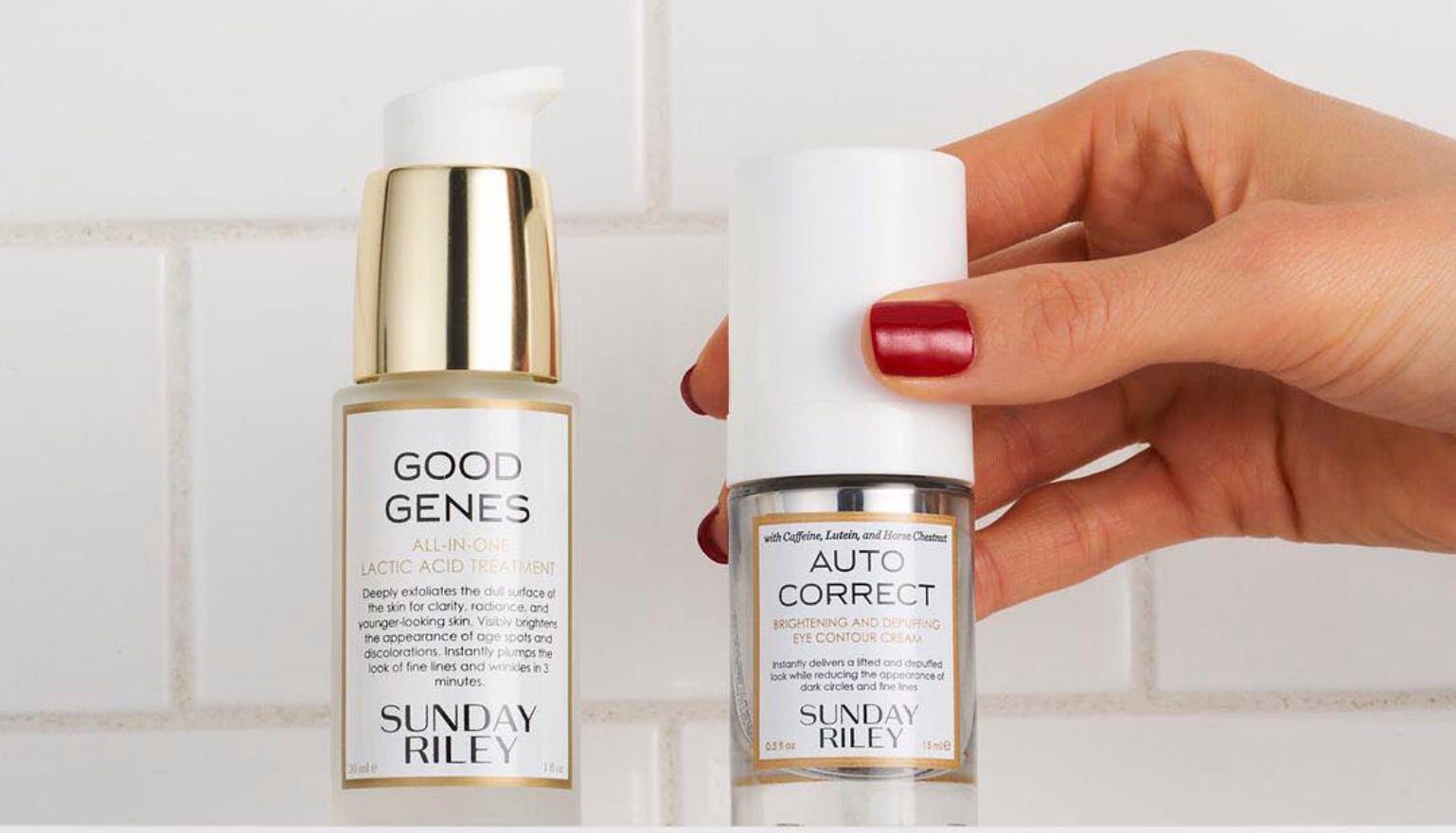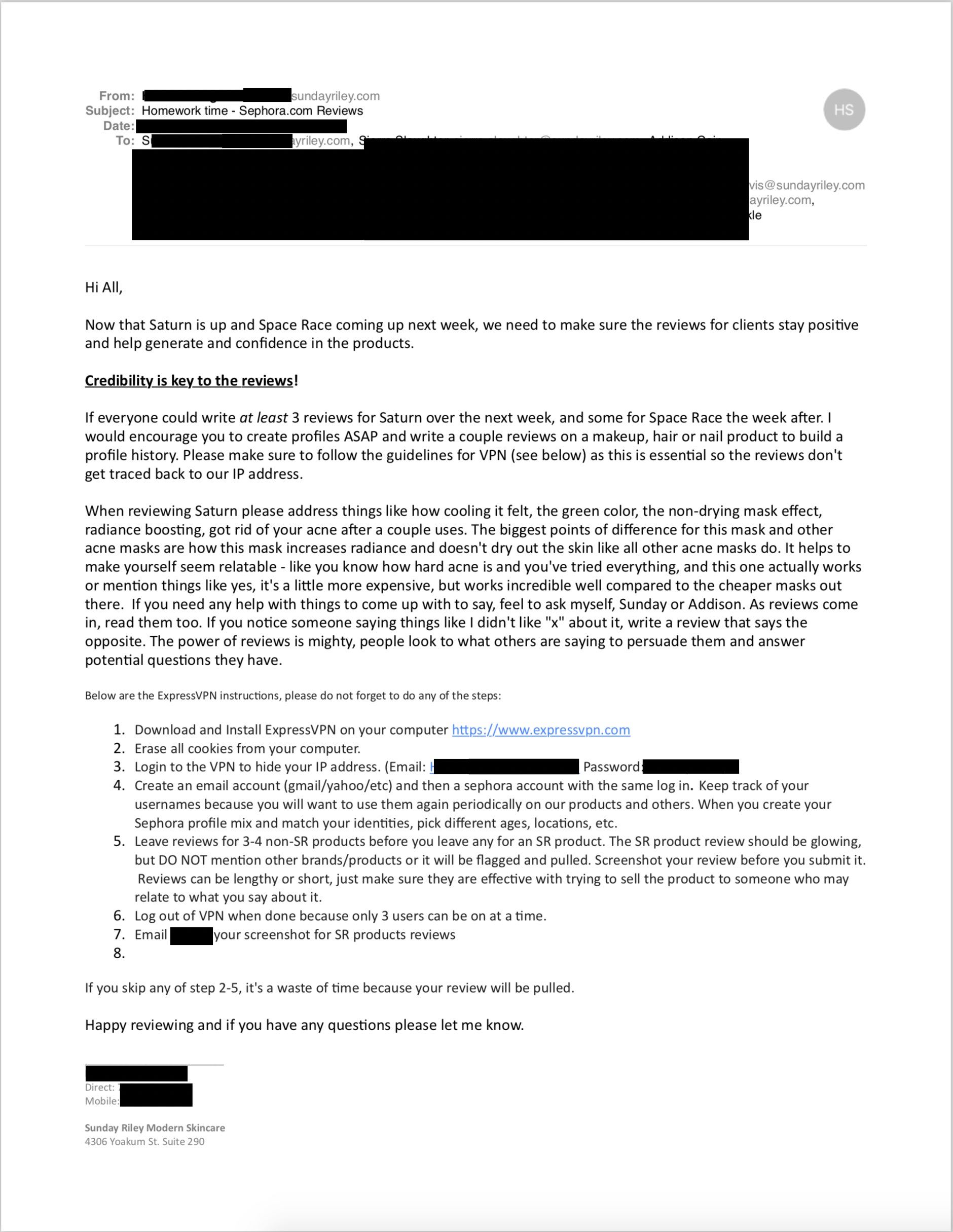A cult beauty brand is the latest to face accusations of fake reviews
Sunday Riley, the beloved skincare brand founded by the cosmetic chemist of the same name, is at the center of a fake review scandal that has shifted the beauty world’s attention away from Deciem’s latest drama.


Sunday Riley, the beloved skincare brand founded by the cosmetic chemist of the same name, is at the center of a fake review scandal that has shifted the beauty world’s attention away from Deciem’s latest drama.
An anonymous Reddit user claiming to be a former employee of the company accused the creator of the cult brightening serum Good Genes of ordering staffers to write inauthentic reviews about the brand’s products, sold by Sephora. In a thread on the site, the person posted what appeared to be an internal email from Sunday Riley’s head of sales, with the title “Homework time — Sephora.com Reviews,” instructing employees to write reviews of two new acne treatment products just released—”at least 3 reviews for Saturn over the next week, and some for Space Race the week after.”
The Reddit user wrote that employees “were forced to write fake reviews for our products on an ongoing basis, which came direct from Sunday Riley herself and her Head of Sales.” Quartz reached the alleged former employee via Reddit, but the person did not reveal their identity, and we could not confirm their claims.
The person did send a less-redacted version of the image of the memo to Quartz over email, which showed the names and email addresses of the head of sales, a manager at the company, Riley herself, and her executive assistant. It also listed the date as Aug. 11, 2017. Here is the redacted version posted on Reddit:

“When reviewing Saturn please address things like how cooling it felt, the green color, the non-drying mask effect, radiance-boosting, got rid of your acne after a couple uses,” the email instructs, before detailing how to use a VPN that would protect employees’ IP addresses from being traced via the reviews.
Although news of the memo has been widely reported, Sunday Riley has not responded to several requests for comments from Quartz. Quartz has also reached out to the people whose names and emails were listed in the un-redacted email, and will update this post with any response.
The beauty industry gossip account @esteelaundry posted a screengrab of a message from Sunday Riley’s Instagram that appeared to confirm that the memo was real. It has since been deleted from Sunday Riley’s account:
The fake review epidemic
In the beauty industry, fraudulent reviews are rampant and regular. As Racked reported last year, the practice of gifting free products to consumers in exchange for positive reviews is common, and has only ballooned with the rise of influencers. Just last month, the Fashion Law reported that beauty influencers on Instagram are sometimes offered over $70,000 for posting negative reviews about products. And while Instagram users advertising for or against a product on their profiles are required by the Federal Trade Commision disclose the endorsement, that doesn’t always happen, possibly because the Facebook-owned platform has yet to finalize its endorsement policy.
Outside of beauty, Amazon has struggled with fraudulent reviews on its site, even though the company has banned “incentivized reviews” (which can involve gifting reviewers with products for positive reviews). And at the far end of the fake review spectrum, we have cases like Oobah Butler’s #1 Trip Advisor restaurant, which involved a completely made-up restaurant being ranked number one on TripAdvisor. Butler, who said he had worked writing false reviews for restaurants on the site, refashioned his own tiny home as “The Shed at Dulwich,” and finagled it into Trip Advisor’s top restaurant spot via false reviews.
Fake reviewing is a risky business, as the Sunday Riley situation shows. And online backlash isn’t the only thing to worry about: A “persistent online review fraudster” in Italy was recently fined €8,000 ($9,300) and sentenced to nine months in prison for operating a company that sold fake reviews to hotels.
Update: Sephora responded after publication with the following comment: “At Sephora, we believe in the power of the beauty community and that knowledge should be shared to benefit all. Sephora has very strict brand rules regarding our Ratings and Reviews, which we know are an important decision tool for our clients. Additionally, we have teams dedicated to protecting the integrity of our Ratings and Reviews, ensuring through detailed moderation that it’s a constant trusted, unbiased, authentic source for all. We do not believe this incident is representative of the Sephora Ratings and Reviews culture, or the countless hours our clients have spent sharing their product experiences with us and others. We’ve been in touch with Sunday Riley on this matter, and they have committed to adhering to our review policy.”